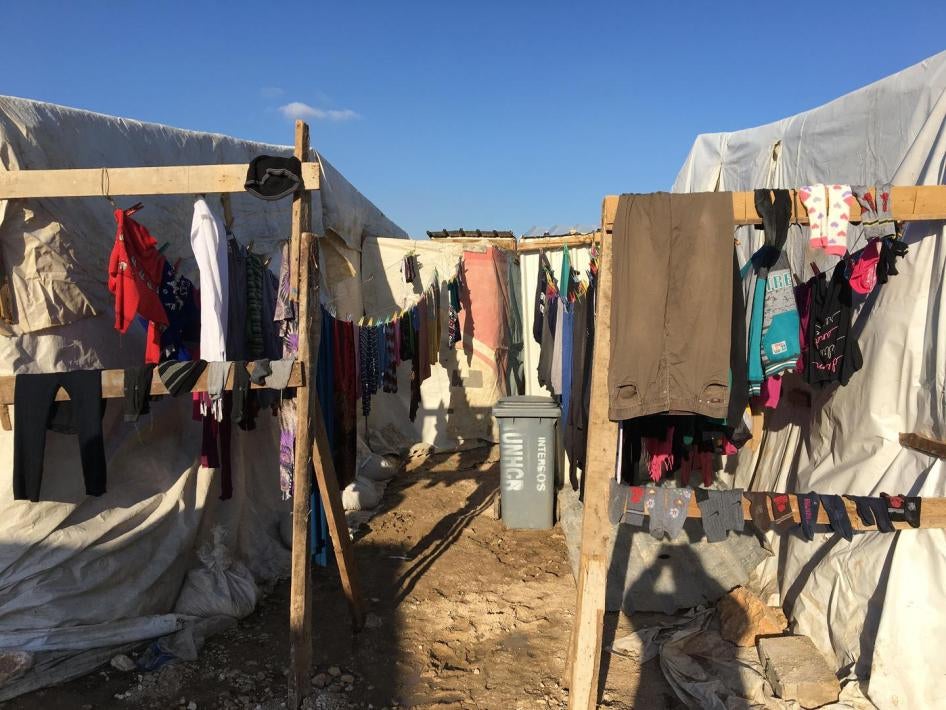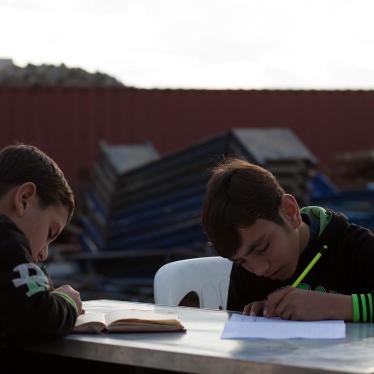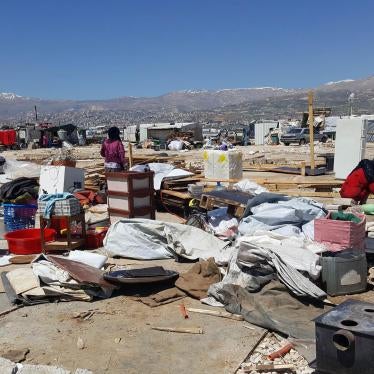(Beirut) – At least 13 municipalities in Lebanon have forcibly evicted at least 3,664 Syrian refugees from their homes and expelled them from the municipalities, apparently because of their nationality or religion, while another 42,000 refugees remain at risk of eviction, Human Rights Watch said in a report released today.
The 57-page report, “‘Our Homes Are Not for Strangers’: Mass Evictions of Syrian Refugees by Lebanese Municipalities,” documents inconsistencies in the reasons municipalities have given for expelling Syrians and the failure of the central government to protect refugees’ rights. United Nations officials identified 3,664 such evictions from 2016 through the first quarter of 2018. While Lebanese municipal authorities make tepid claims that the evictions were based on housing regulation infractions, Human Rights Watch found the measures taken by these municipalities have been directed exclusively at Syrian nationals, and not Lebanese citizens or other foreign nationals.
Mass Evictions of Syrian Refugees by Lebanese Municipalities
Human Rights Watch interviewed 57 Syrian refugees affected by evictions, as well as municipal officials and legal experts. The UN High Commissioner for Refugees released figures on April 13 estimating that about 13,700 Syrians had been evicted in 2017. Those figures include not only the 3,664 municipal evictions, but also evictions for failure to pay rent and other disputes with landlords or landlord choices, as well as “safety and security” evictions. Lebanon’s Ministry of Social Affairs also reported to Human Rights Watch that 7,524 Syrians were evicted from the vicinity of the Rayak air base in 2017 and another 15,126 still have pending eviction orders.
The municipal evictions have caused refugees to lose income and property. They have disrupted the refugees’ children’s education, in some cases causing children to miss months of schooling or to drop out. In some cases, Syrians said authorities used violence to evict them. The municipal authorities have not provided any opportunity to the refugees to challenge their evictions or other due process protections based on international standards.
Lebanon’s refugee-hosting fatigue has been exacerbated by a lack of international support. The UN appeal for more than US$2 billion in international aid to meet the humanitarian assistance needs of Syrian refugees in Lebanon for 2017 was only 54 percent funded as of December 2017. The Friends of Syria Group meeting in Brussels on April 24-25, 2018, hosted by the European Union and the UN, should make protecting refugee rights and sharing responsibility for humanitarian needs their priorities.
Seven years into the crisis in Syria, Lebanon hosts 1 million registered Syrian refugees, the highest per capita number of any country. These municipal evictions are occurring as politicians and others are increasingly calling for refugees to return to Syria.
“Mahmoud,” 56, who had been living in the Zahle municipality since 2012, said that a group of municipal police kicked and banged on the door of his family home last August and demanded to see all their papers, including legal residency papers, a rental contract, and UN registration. Mahmoud said one of the police “gave us a paper to sign that said we had to leave our house, but what she said verbally was to leave Zahle and go back to Syria. I replied to her that I wished I could go back, but that I couldn’t.”
The mass evictions of Syrian refugees that occurred with increasing frequency in the last quarter of 2017 show no sign of being the result of a coherent national plan, but rather an ad hoc response that appears in some municipalities that – except for Tamnine al-Tahta – are predominantly Christian. All the Syrian refugees interviewed identified as Muslim, though humanitarian agencies have also documented the eviction of Syrian Christians. Most of those interviewed attributed their eviction, in part, to their religious identity.
Related Content
Relevant ministries of the Lebanese government, including the Ministry of Interior and Municipalities, should intervene to prevent municipal-level mistreatment of Syrian refugees and to ensure that they are not left homeless and destitute as a result of unlawful actions, Human Rights Watch said.
“Countries gathered at the Friends of Syria meeting should increase support to Lebanon to enable it to meet its legal and humanitarian obligations toward the refugees,” Frelick said. “For their part, Lebanese leaders should curb rhetoric that encourages or condones forced evictions, expulsions, and other discriminatory and harassing treatment of refugees in Lebanon.”









